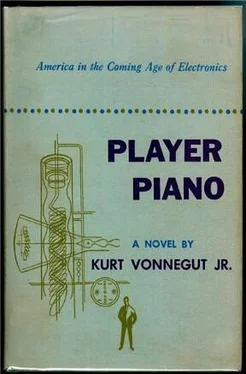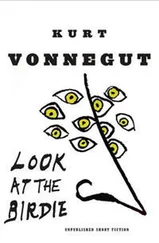"Yes."
"I'm Doctor Pond. Would you like me to turn on the lights?"
"Please, Doctor."
"Well, there aren't any. Kerosene lanterns throughout. Want to wash your hands or something?"
"Well, not -"
"Because, if you do, there's a pump in the back yard, and an outhouse by the chicken coop. Would you like to see the termites, the dry rot, the hog pen, and the manurespreader, or shall we go to see that Georgian on Griffin Boulevard?" He walked to where they could see each other. Doctor Pond was very young, fat, and earnest, and plainly distressed by his surroundings.
"You're certainly eager to sell me the place," said Paul, laughing. With each new inconvenience, the place became more irresistible. It was a completely isolated backwater, cut off from the boiling rapids of history, society, and the economy. Timeless.
"I have a certain responsibility," said Doctor Pond carefully. "An administrator without a certain awareness, above and beyond the Manual, is like a ship without a rudder."
"He is?" said Paul absently. He was peering through a back window into the barnyard, and beyond that, through an opened barn door, where he could see the firm buff flank of a cow.
"Yes," said Doctor Pond, "like a ship without a rudder. For example, while the Manual doesn't tell me to do it, I make very sure that every man gets a house suited to his station on the ladder of life. The way a man lives can destroy or increase the stature of his job - can increase or decrease the stability and prestige of the entire system."
"You say I can get this whole farm for eight?"
"Please, Doctor - you put me in an uncomfortable position. I was excited when you first called, because this place has been such a headache for so long. But then my conscience started to work on me, and, well, I simply can't let you do it."
"I'll take it. Do the animals go with it?"
"Everything goes with it. That's in Gottwald's will and in the deed. It has to be kept just as it is and it must be farmed. See how impossible it is? Now, shall we go to Griffin Boulevard, where there's just the right house for the Manager of the Ilium Works?" When he spoke the title, his voice sounded like a choir of French horns.
"I want this."
"If you try to force me to sell it, I'll quit." Doctor Pond reddened. "My classification number may be twice what yours is, but I have a certain amount of integrity."
The word, coming from Pond, struck Paul as ridiculous at first, and he started to smile about it. Then he saw how tense the man was, and realized that what Pond was talking about was, by God, integrity. This pipsqueak of a man in a pipsqueak job had pipsqueak standards he was willing to lay his pipsqueak life down for. And Paul had a vision of civilization as a vast and faulty dike, with thousands of men like Doctor Pond in a rank stretching to the horizon, each man grimly stopping a leak with his finger.
"This would be a hobby, of course - a plaything," Paul lied. "I'd go on living where I'm living now."
Doctor Pond sighed and sank into a chair. "Oh - thank the Lord! Oh! You have no idea how much better I feel." He laughed in nervous relief. "Of course, of course, of course. And you'd keep Mr. Haycox on?"
"Who is Mr. Haycox?"
"The Reek and Wreck who's assigned to keep the place going. He's under orders from the Reeks and Wrecks, but of course the Gottwald estate pays him. You'd have to do the same."
"I'd like to meet him."
"He's an antique too." He threw his hands over his head. "What a place. I think you're mad, simply mad. But he who pays the piper calls the tune."
"As long as he doesn't threaten to disgrace the system."
"Exactly! That's almost good enough to carve over your mantel, but I doubt if the deed will let you."
"How about, 'After us the deluge,' " said Paul.
"Hmm?" Doctor Pond tried to make sense of the quotation, seemingly decided that it was some archaic, pleasant sentiment for those who understood poetry, and smiled. "That's nice too." Apparently the word "deluge" stuck in his mind. "Now, about the cellar here: it has an earth floor and is damp." He leaned out of the back door, wrinkled his nose in the sweet, stringent odor of manure cooking in the sunlight, and shouted, "Mr. Haycox! Oh, Mr. Haycox!"
Paul had opened the back of a grandfather clock. "I'll be damned," he said under his breath. "Wooden works." He checked his own watch, the shock-proof, waterproof, antimagnetic, glow-in-the-dark, self-winding chronometer Anita had given him for Christmas, and found that the grandfather clock was off by about twelve minutes. Indulging an atavistic whim, he set his watch to correspond with the hands of the relic, which grated and creaked away the seconds, sounding like a wooden ship straining in a strong wind.
The house was certainly one of the oldest in the valley. The rough rafters were inches above Paul's head, and the fireplace was sooted black, and there wasn't a true right angle anywhere. The house seemed to have twisted and stretched on its foundations until it had found a position of comfort for all of its parts - like a sleeping dog.
More remarkable than the way the house had relieved its stresses was the way it conformed to Paul's particular, not to say peculiar, needs. Here was a place where he could work with his hands, getting life from nature without being disturbed by any human beings other than his wife. Not only that, but Anita, with her love for things colonial, would be enchanted, stunned, even, by this completely authentic microcosm of the past.
"Ah," said Doctor Pond, "Mr. Haycox at last. When you yell for him, he never yells back. Just starts coming, taking his own sweet time."
Paul watched Mr. Haycox's heavy-footed progress across the hard-packed earth of the barnyard. The caretaker was an old man, with close-cropped white hair, coarse, tanned skin, and, like Rudy Hertz, with remarkably big hands. Unlike Rudy, Mr. Haycox wasn't desiccated. His flesh was firm, hard, and well colored. The chief toll he seemed to have paid time was in teeth, of which he had few. He might have been part of a pageant recalling farm life as it had once been. He wore old-fashioned blue denim overalls, a wide-brimmed straw hat, and heavy, crusty work shoes.
As though to point up the anachronism of Mr. Haycox and the Gottwald place for Paul, one of Doctor Ormand van Curler's men, riding on a tractor, appeared on the other side of the windbreak, snappy in spotless white coveralls, a red baseball cap, cool sandals which almost never touched the ground, and white gloves which, like Paul's hands, rarely touched anything but steering wheels, levers, and switches.
"What do you want?" said Mr. Haycox. "What's the matter now?" His voice was strong. He had none of the sheepishness or obsequiousness Paul had seen so frequently in Reeks and Wrecks. Mr. Haycox bore himself as though he owned the place, wanted the talk to be as brief and pithy as possible, and doubted that whatever was wanted of him could possibly be more important than what he had been doing.
"Doctor Proteus - this is Mr. Haycox."
"How are you?" said Paul.
" 'Do," said Mr. Haycox. "What kind of doctor?"
"Doctor of Science," said Paul.
Mr. Haycox seemed annoyed and disappointed. "Don't call that kind a doctor at all. Three kinds of doctors: dentists, vets, and physicians. You one of those?"
"No. Sorry."
"Then you ain't a doctor."
"He is a doctor," said Doctor Pond earnestly. "He knows how to keep machines healthy." He was trying to build up the importance of graduate degrees in the mind of this clod.
"Mechanic," said Mr. Haycox.
"Well," said Doctor Pond, "you can go to college and learn to be a specialist in all sorts of things besides making people or animals well. I mean, after all. The modern world would grind to a halt if there weren't men with enough advanced training to keep the complicated parts of civilization working smoothly."
Читать дальше








![Курт Воннегут - Вампитеры, фома и гранфаллоны [litres]](/books/397997/kurt-vonnegut-vampitery-foma-i-granfallony-litre-thumb.webp)